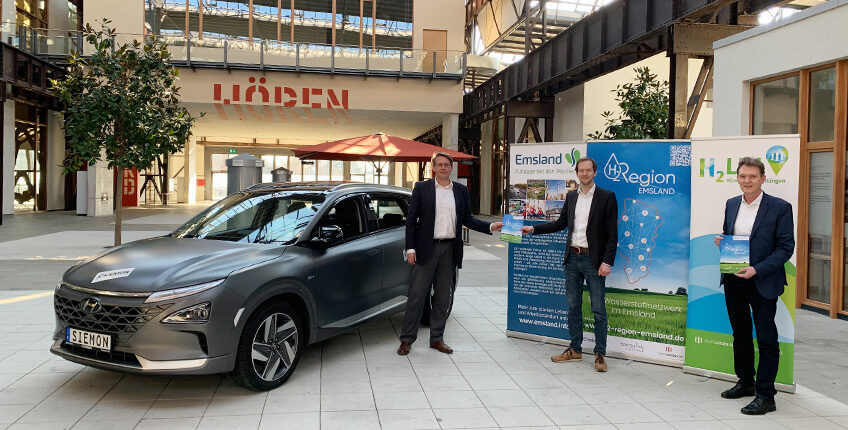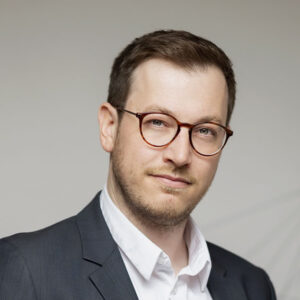The district of Emsland is regarded throughout Germany as a pioneering region in terms of developing a climate-friendly hydrogen economy. The completion of the HyExpert concept now signifies another milestone.
The feasibility study “HyExperts: Emsland H2 region” was funded in the framework of the HyLand competition by the Federal Ministry for Digital and Transport (BMDV– Bundesministerium für Digitales und Verkehr) in the amount of €300,000.
The final concept contains specific projects and project approaches for the hydrogen region, with a particular focus on mobility. Among other elements, hydrogen filling stations were envisaged, which are now to be built.
Over 100 pages of detailed concept, concrete plans for the hydrogen region in 2030 and numerous practical projects that will be implemented together with the companies – this is how the feasibility study presented by the H2 region can be summarized. It is based on 18 months of intensive project work with the companies and municipalities in the region, as Emsland District Administrator Marc-André Burgdorf knows well: “In this study we have summarized the activities in our region, linked them together and developed them further. The over 30 events with a total of more than 2,800 participants, 1,500 followers on social media, around 100 company talks and the now more than 45 hydrogen projects demonstrate that the interest in the hydrogen region is huge and, because of its strong industry and innovative SME sector, Emsland is renowned nationwide as a leading region. We now want to implement the projects which for example, deal with the building of hydrogen filling stations and the use of hydrogen-powered vehicles as soon as possible.”
First practical projects already during concept development
In addition to the expansion of hydrogen mobility, a particular focus of the project is on connecting the stakeholders and projects and facilitating collaborations. “Developing a hydrogen economy requires our strengths to be combined”, clarifies Lingen’s Mayor Dieter Krone. “The companies in Lingen want to build up to an electrolysis capability of 2,400 Megawatts by 2030. The amount of hydrogen produced would be sufficient to drive more than 25,000 trucks over 1.8 billion kilometres, carbon-neutrally. Users of the green hydrogen could include primarily small and medium-sized enterprises in the region, which we are already now actively involving in the process.”
The first projects were already launched during the concept development phase, like for example, the acquisition of a hydrogen-powered bulky waste vehicle. Additional project applications for the expansion of the hydrogen network are in the preparatory phase, explains Dr. Tim Huseman, Head of the Emsland H2 region office and project leader for the HyExperts project: “More than ten refuelling stations at different locations throughout Emsland are either being planned or are even already being built. Therefore we are making huge strides towards nationwide provision of hydrogen filling stations.”
Emsland H2 region considered a showcase region in the HyLand competition
For the Emsland H2 region, the successful completion of the projects also means that now more funding for practical projects can be obtained. As a next step, the hydrogen region is aiming to apply for the HyPerformer level of the HyLand programme. As well as the building of filling stations, vehicle acquisition is a particular focus here. Alexander Gehling, Programme Manager of NIP and Coordinator of the HyLand competition at NOW GmbH, makes clear that the Emsland region has very good chances of receiving further support: “The approach that we are taking in the HyLand competition is perfectly manifested by the Emsland region. The goal is to demonstrate how hydrogen-powered mobility can work in the entire system and how this can also succeed in other German regions. The Emsland consortium must now make the investment decisions and avail of the various funding pools.”
The development of Emsland as a hydrogen region was funded under the National Innovation Programme for Hydrogen and Fuel Cell Technology (NIP2) by the Federal Ministry of Transport and Digital Infrastructure with a total project amount of €300,000. The funding guideline is coordinated by NOW GmbH and implemented by Project Management Jülich (PtJ).
CO2-neutral hydrogen mobility can only be realised together
The Emsland H2 region warmly invites all those interested in the acquisition of one or more hydrogen vehicles to make contact. “Only together can we make CO2-neutral hydrogen mobility a reality”, emphasizes Tim Huseman. Contact details as well as information about the hydrogen projects in the region can be found at www.h2-region-emsland.de.


